When visiting Iceland, one of the first things travelers will notice is how widespread English is; from signs and menus to the way locals quickly switch from Icelandic to English to help out visitors find their ways. However, not every Icelander speaks English, and there is real value to learning the basics of Iceland’s language to help you make the best of your trip.
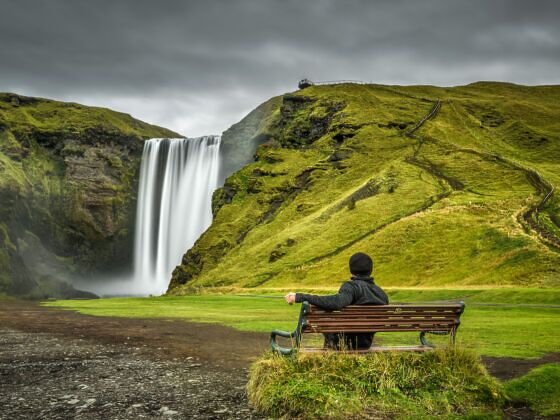
This Guide to Icelandic Will Have the Locals Guide You to All the Secret Waterfalls
This guide will give you a good overview of Iceland’s language, including Icelandic greetings and other Icelandic words and phrases that will help you connect and befriend Icelanders.
The author:
Michelle Spinei has lived in Iceland for over five years. She studied Icelandic at Mímir and The Tin Can Factory language schools in Reykjavík and at an immersion course in the Westfjords at Háskólasetur Vestfjarða.
- Where is Icelandic spoken?
- Icelandic language basics
- Icelandic pronunciation guide
- Icelandic greetings and common phrases
- Icelandic words and phrases to order food and drinks
- Icelandic words and phrases for shopping
- Icelandic words to describe nature and landscapes
- Icelandic phrases for getting around
- Icelandic terms for hiking and outdoor recreation
Where is Icelandic spoken?
Icelandic is the national language of Iceland, home to over 370,000 residents. The majority of Icelandic speakers live in Iceland, but speakers can also be found in Denmark, Norway, Sweden, Canada, and the United States.
Present day Icelandic belongs to the North Germanic group of languages, related to Norwegian and Faroese, and has developed from Old Norse, which was brought over from Norway by Viking settlers in the ninth century. Unlike other languages, Icelandic has not changed much throughout the centuries. In fact, there is an Icelandic Language Committee whose job is to keep the language unaltered by the influence of other languages.
According to The Little Book of Icelandic author, Alda Sigmundsdóttir, what makes Icelandic special is, “how little it has changed since the settlement of the country, and how few people speak it worldwide.” Alda explained how knowing some Icelandic can be helpful to visitors in Iceland, “I believe it is always appreciated by locals when visitors try to speak a word or two in the local language, since it shows a willingness to recognize the other’s culture and uniqueness.”
Icelandic language basics
- As a general rule, when pronouncing Icelandic, the stress falls on the first syllable of the word. For example, the capital city of Reykjavík, is pronounced RAKE-yah-veek.
- Icelandic doesn’t have indefinite articles (a/an) but uses the definite article (the) which is located at the end of the word.
- The use of compound words is common. For example, the name of the volcano Eyjafjallajökull, is a composite of three words: eyja (island), fjall (mountain), and jökull (glacier).
Icelandic pronunciation guide
The Icelandic alphabet is made up of 32 letters, including three letters English speakers don’t use: þ,ð, and æ.
- Þ pronounced like “th” is called “thorn”
- Ð is also pronounced like a soft “th” and is called “eth”
- Æ is pronounced like “eye” and is called “ash”
Icelandic is phonetic and each letter is pronounced.
| Letter | Pronunciation |
|---|---|
| í | Like “ee” in “street” |
| ý | Pronounced the same as “í” |
| é | Like “ye” in “yes” |
| e | Like “e” in “bed” |
| ö | Like “u” in “urgent” |
| ú | Like “oo” in “noon” |
| o | Like “o” in “more” |
| a | Like “a” in “bar” |
| ó | Like “o” in “no” |
| ei | Like “ay” in “stay” |
| ey | Pronounced the same as “ei” |
| au | Like “oy” in “toy” |
| æ | Like “eye” in Popeye |
| á | Like “ow” in “now” |
| ð | Like “th” in “father” |
| þ | Like “th” in “thank” |
Icelandic greetings and common phrases
It’s useful to know how to say hello in Icelandic, “halló”, which sounds very similar to the English equivalent. The second-most useful phrase is thank you in Icelandic, which is “takk fyrir”.
An Icelandic phrase that is commonly heard is “jæja”. The closest English equivalent would be “well then”. If there is a lull in a conversation, if you want to leave a party, if you’re expressing an opinion — it’s the ultimate filler word.
| English | Icelandic |
|---|---|
| Hello | Halló |
| Hi | Hæ |
| Good morning | Góðan daginn |
| Good evening | Góða kvöldið |
| Bye | Bless |
| What’s your name? | Hvað heitir þú? |
| My name is… | Ég heiti… |
| How are you? | Hvað segir þú? |
| I’m good, and you? | Allt gott, En þú? |
| See you tomorrow | Sjáumst á morgun! |
| Yes | Já |
| No | Nei |
| Thank you | Takk fyrir |
| So… | Sko |
| Well then | Jæja |
Icelandic words and phrases to order food and drinks
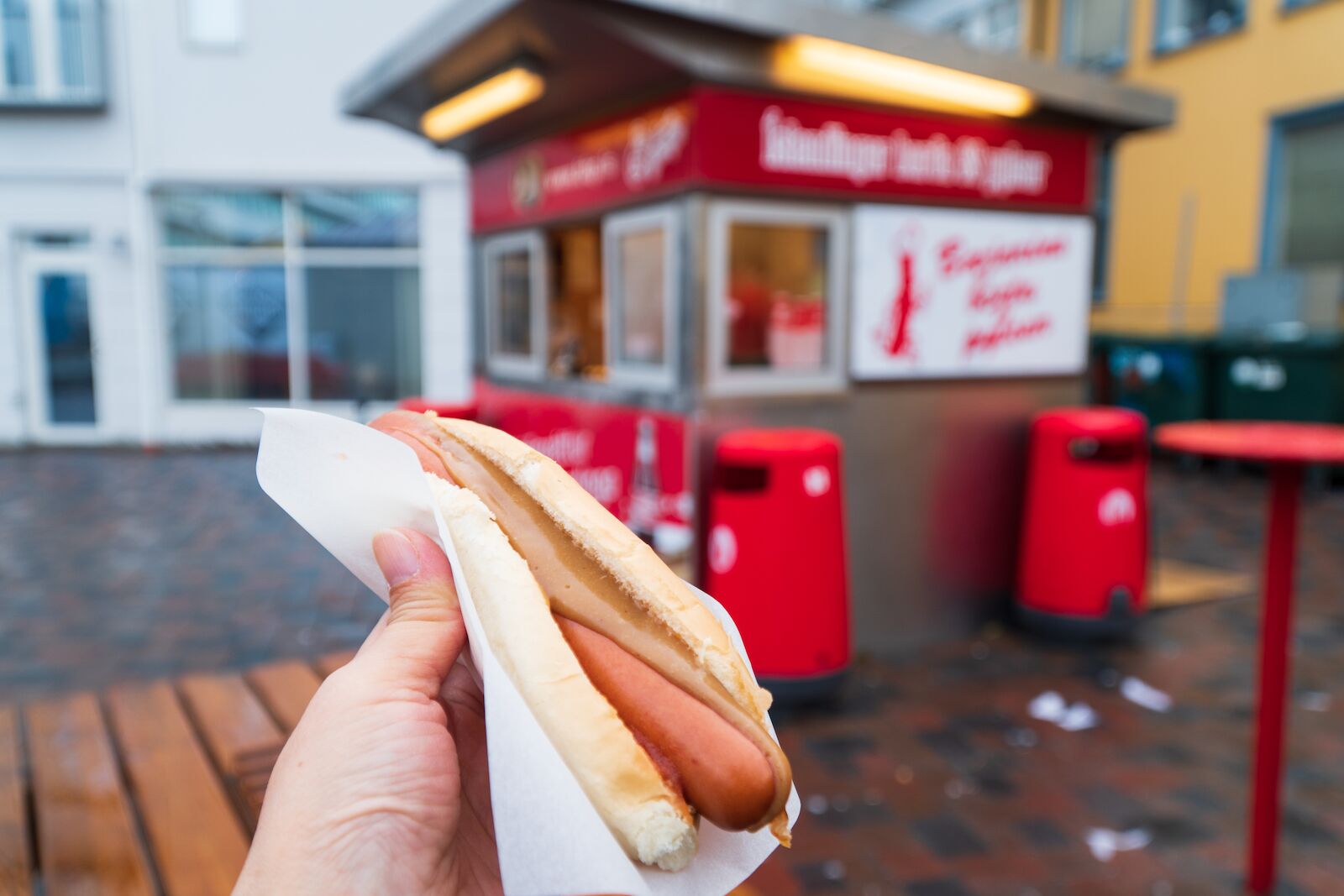
Photo: Mayer Chan/Shutterstock
Icelandic restaurants often feature dishes of fresh fish and meat, most notably lamb. Popular dishes include plokkfiskur (a stew of potatoes and haddock) and lambafillet (lamb) although most restaurants also offer vegetarian and vegan options.
Iceland’s dining culture is informal, tipping is not required and waiters will not bring you a check at the end of the meal, so you have to go to the bar or counter and pay when you’re finished.
| English | Icelandic |
|---|---|
| Coffee | Kaffi |
| Milk | Mjólk |
| Water | Vatn |
| Tea | Te |
| Hot cacao | Kakó |
| Beer | Bjór |
| Wine | Vín |
| Bread | Brauð |
| Butter | Smjör |
| Cheese | Ostur |
| Fruit | Ávextir |
| Cereal | Morgunkorn |
| Sandwich | Samloka |
| Soup | Súpa |
| Fish | Fiskur |
| Meat | Kjöt |
| Potatoes | Kartöflur |
| Vegetables | Grænmeti |
| I would like one hot dog with everything (use this phrase at hot dog stands in Iceland to get a hot dog with raw onion, fried onion, remoulade, ketchup, and mustard) | Ég ætla að fá eina pylsu með öllu |
| What can I offer you? | Hvað get ég boðið þér? |
| Are you ready to order? | Ertu tilbúin að panta? |
| I’m going to get… | Ég ætla fá… |
| Here you are | Gjörðu svo vel |
| Thank you (said after a meal to show appreciation) | Takk fyrir mig |
Icelandic words and phrases for shopping
When shopping, it’s helpful to know how to ask what things cost, and to know the basic words for Icelandic numbers. It’s important to note that most Icelandic stores take credit and debit cards and the local currency is the króna.
| English | Icelandic |
|---|---|
| What does this cost? | Hvað kostar þetta? |
| Do you want anything else? | Eitthvað fleira? |
| Do you want the receipt? | Viltu kvittun? |
| Do you want a bag? | Viltu poka? |
| Icelandic sweater | Lopapeysa |
| Icelandic wool | Íslensk ull |
| Zero | Núll |
| One | Einn |
| Two | Tveir |
| Three | Þrír |
| Four | Fjórir |
| Five | Fimm |
| Six | Sex |
| Seven | Sjö |
| Eight | Átta |
| Nine | Níu |
| Ten | Tíu |
Icelandic words to describe nature and landscapes
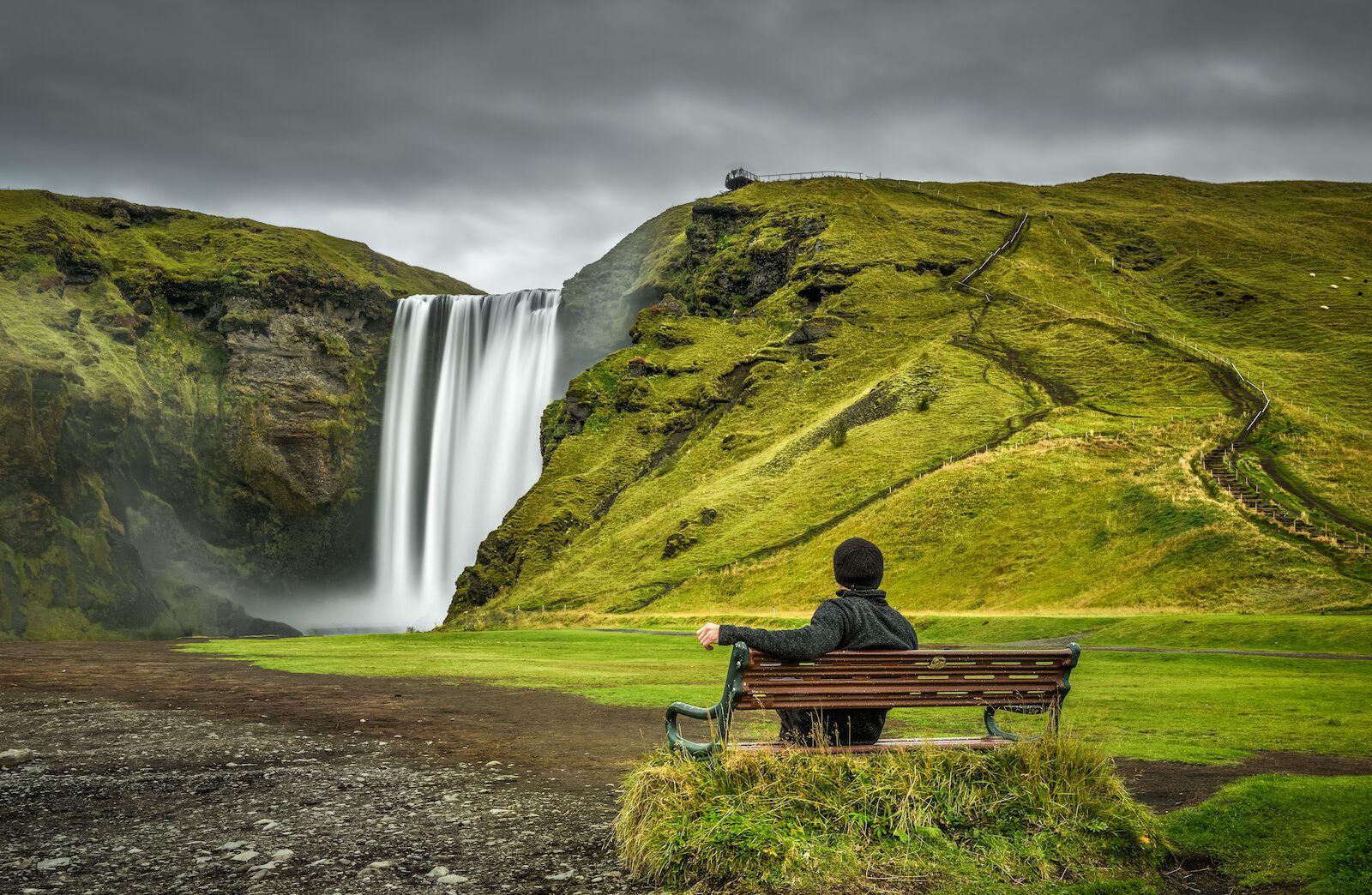
Photo: Nick Fox/Shutterstock
When driving around Iceland, you’re sure to come across long place names that are difficult to pronounce, but oftentimes, these names refer to the geography around. For example, the famous waterfall on the south coast of Iceland, Skógafoss, is a composite word of skógar (forests) and foss (waterfall).
| English | Icelandic |
|---|---|
| Fjord | Fjörður |
| Waterfall | Foss |
| Volcano | Eldgos |
| Glacier | Jökull |
| Mountain | Fjall |
| Moss | Mosi |
| Forest | Skógur |
| Lava fields | Hraun |
| Natural hot springs | Hverir |
| Puffin | Lundi |
| Sheep | Kind |
| Horse | Hestur |
| Arctic fox | Refur |
Icelandic phrases for getting around
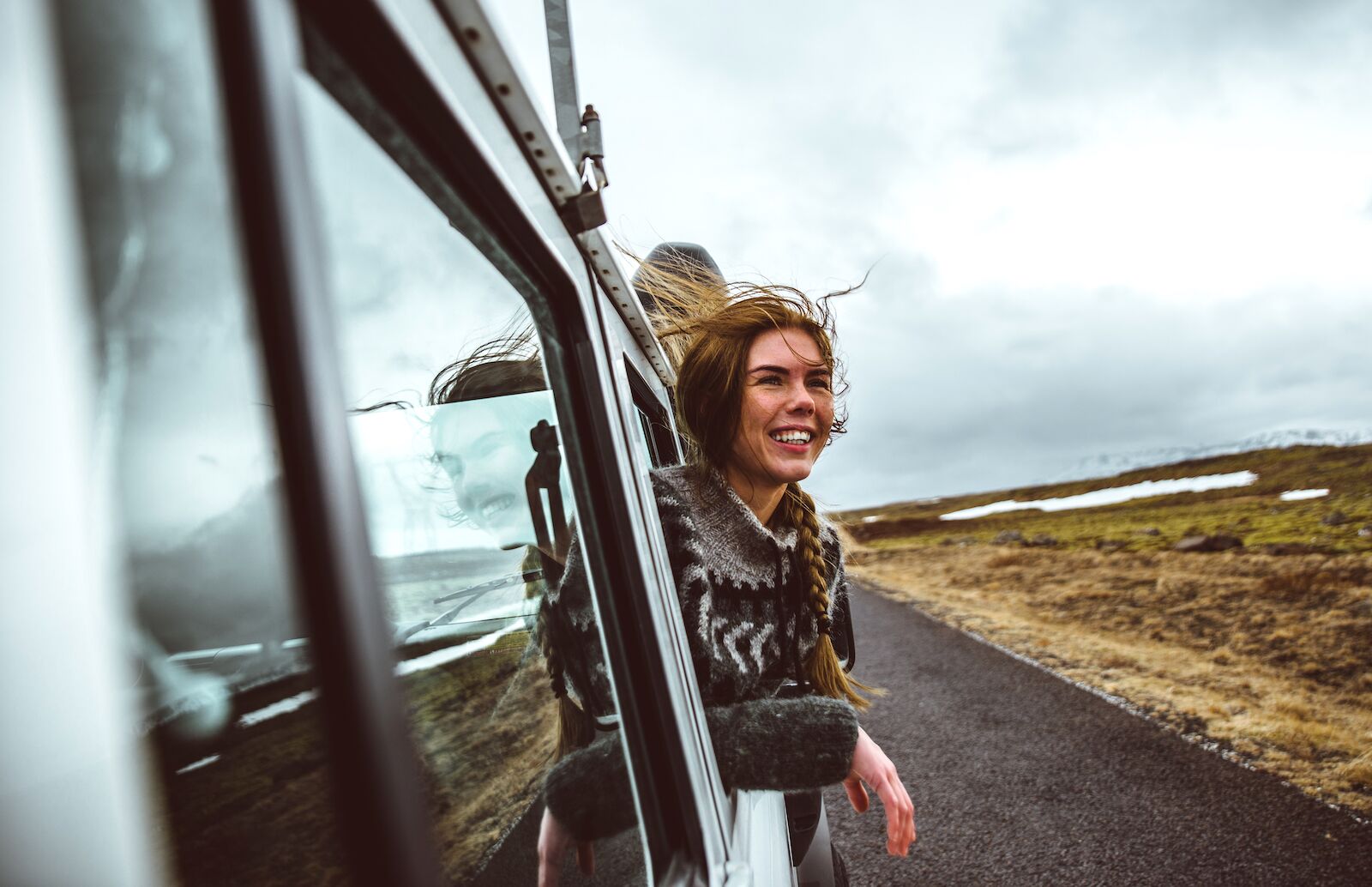
Photo: oneinchpunch/Shutterstock
Getting around in Iceland is easiest if you have a rental car. Once you fly into Keflavík airport, you can take a bus to Reykjavik, either to the bus terminal or to your hotel.
Transportation options within Iceland are limited to cars and buses (there are no trains or subways in Iceland). Some areas of Iceland have gravel roads and one-lane bridges that require special attention, and driving off-road is prohibited.
| English | Icelandic |
|---|---|
| Push | Ýta |
| Pull | Toga |
| Entrance | Inngangur |
| Exit | Útgangur |
| Rental car | Bílaleigubíll |
| Automatic | Sjálfskiptur |
| Manual transmission | Beinskiptur |
| Single-lane bridge | Einbreið brú |
| Paved road changes to gravel | Malbik endar |
| Blind curve | Blindhæð |
| Bus | Strætó |
| Plane | Flugvél |
| Hitchhiking | Puttaferðalangur |
| Arrivals | Komur |
| Departures | Brottfarir |
| Lost and found | Tapað/Fundið |
| Excuse me, can you tell me where I can find Harpa (a famous concert hall in Reykjavík)? | Afaskið, getur þú sagt mér hvar Harpa er? |
Icelandic terms for hiking and outdoor recreation
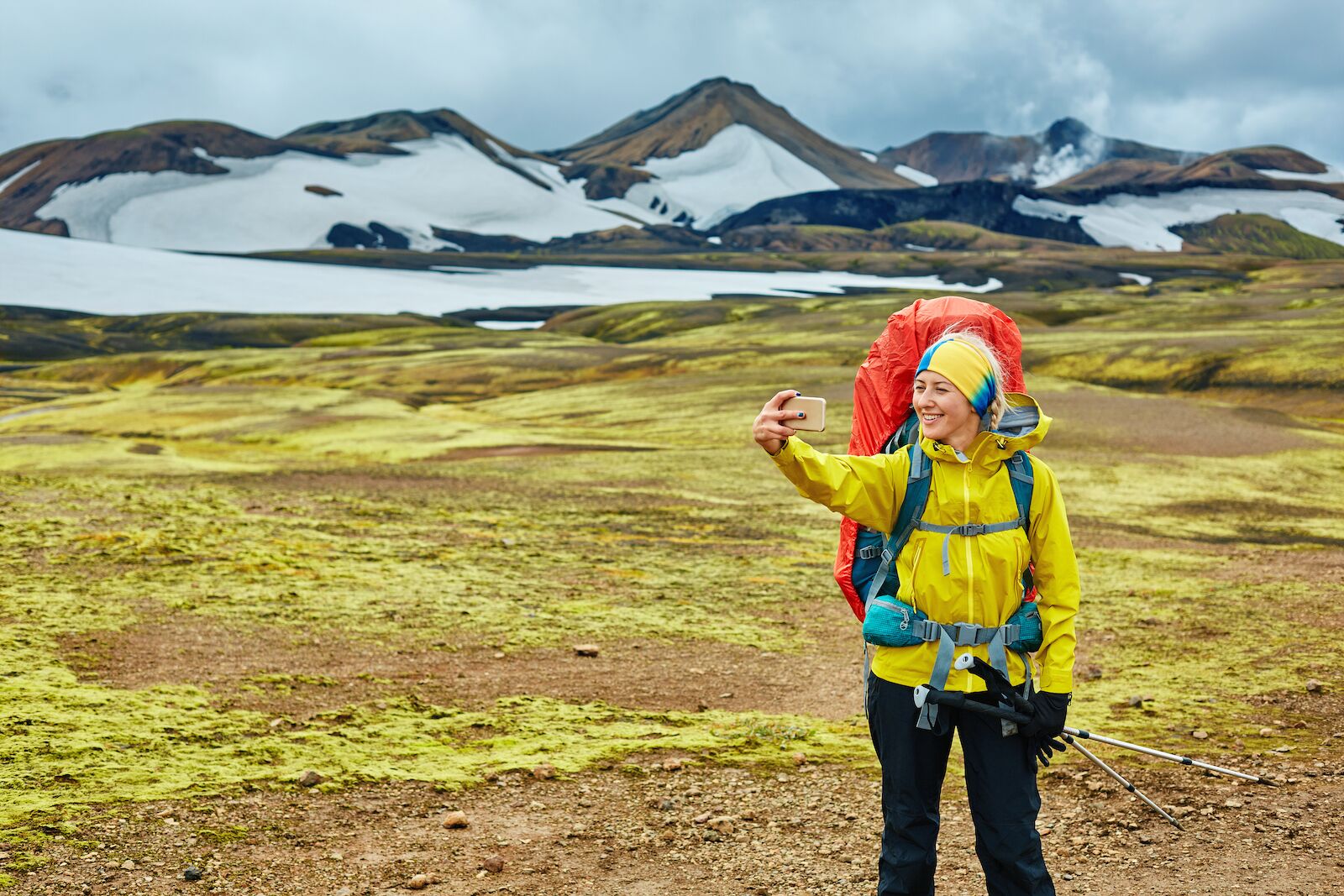
Photo: Vitalii Matokha/Shutterstock
Camping and hiking is a great way to see the countryside, and it’s important to have proper gear and come prepared with lots of layers in case of bad weather.
| English | Icelandic |
|---|---|
| Sleeping bag | Svefnpoki |
| Tent | Tjald |
| Hiking shoes | Gönguskór |
| Rain gear | Regnföt |
| Mountain cabin | Fjallaskáli |
| Camping | Tjaldgisting |
| To go on a hike | Að fara í fjallgöngu |
| Hiking trail | Gönguleiðir |
| To go fishing | Að veiða |
| Window weather (when it looks like it will be a nice day, but when you step outside you realize it’s cold and windy) | Gluggaveður |
| Good attitude (often said by Icelanders before going on a trip) | Góða skapið |